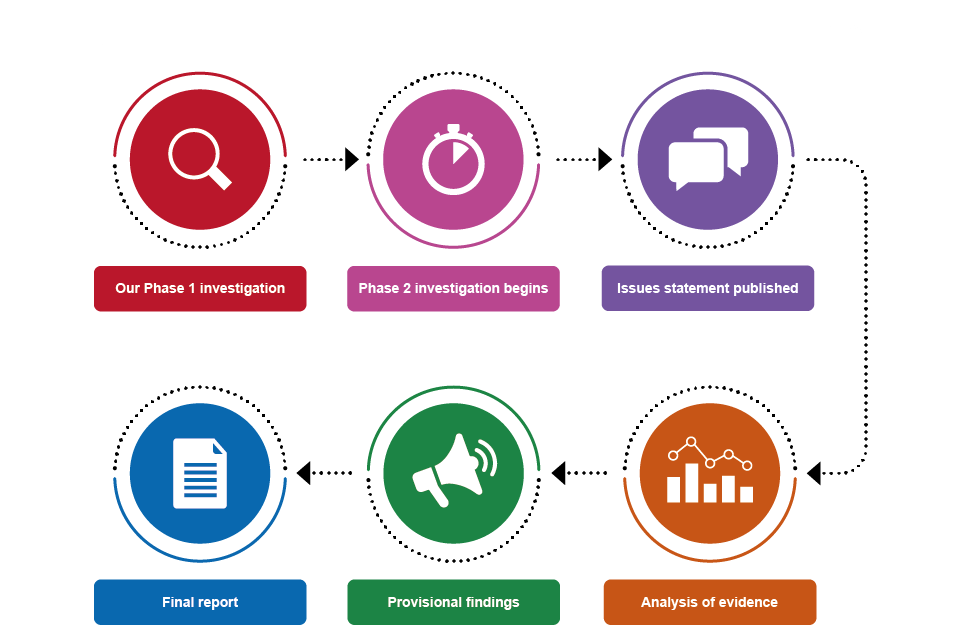How we investigated the Vodafone / Three merger
Why the Competition and Markets Authority (CMA) cleared the Vodafone / Three merger and what it could mean for customers.
The CMA investigates some mergers and assesses how they could affect competition in the UK. This is to ensure a fair and competitive environment, where businesses and the UK economy thrive, and consumers can be confident they are getting great choices and fair deals.
Competition can help to drive growth, keep prices low, as well as provide an important incentive for businesses to improve their services.
Find out more about how mergers are investigated.
After our in-depth investigation, Vodafone and Three signed binding commitments (final undertakings) to help protect consumers and wholesale customers. Accepting those undertakings, we cleared the merger.
Read more details on the case page.
How we investigated this merger
In April 2024 we adopted a new process for phase 2 investigations.
The Vodafone / Three case followed our previous process:

Our previous process for merger investigations, as described below.
Phase 1: January to March 2024
In our initial investigation (called a ‘phase 1 investigation’) we found that the merger, which would combine 2 of the 4 mobile network operators in the UK, could lead to a substantial lessening of competition. We decided that a more in-depth investigation, known as ‘phase 2’, was needed.
Phase 2: April 2024
At phase 2, we gathered more evidence from the merging businesses and others to understand how the merger could affect competition.
The inquiry was run by an appointed group of people with a range of business, finance, economic and legal experience. This group was responsible for deciding the statutory questions on the case.
Issues statement: May 2024
This statement set out:
- the initial focus of the phase 2 investigation
- the potential concerns we investigated (what we call ‘theories of harm’)
- how our phase 2 investigation would focus on the identified theories of harm
We invited anyone – including businesses and members of the public – to share their views with us, and published their responses.
Analysis of evidence: May to September 2024
After publishing the issues statement, we continued to gather and analyse evidence. We held hearings and calls with Vodafone and Three (and third parties) to ask questions about the evidence received, and to explore important issues.
Provisional findings: September 2024
Once the inquiry group had a good understanding of Vodafone and Three, and a strong evidence base, it published its provisional findings in September 2024.
It found that:
- the merger might lead to price rises or reduced services (like smaller data packages) for tens of millions of mobile customers
- those higher bills or reduced services would significantly affect those customers least able to afford mobile services
- many customers might have to pay more for improvements in network quality that they don’t value
- the deal would affect wholesale customers by reducing available network operators from 4 to 3 – likely meaning they are less able to secure competitive terms and offer the best deals to retail customers
The inquiry group noted that the merger could improve the quality of mobile services and bring forward next generation 5G networks and services.
However, they also considered that:
- the merged company might not follow through on its proposed investment programme after the merger
- those improvements, if delivered, may not be as significant as claimed
The inquiry group also published its first thoughts on potential solutions to its concerns (known as ‘remedies’), in the form of a ‘remedies notice’.
Remedies working paper: November 2024
On 5 November 2024, the inquiry group announced its provisional view that the merger could go ahead, if Vodafone and Three offered legally binding commitments that address the concerns it outlined in September.
The inquiry group invited comments and suggestions before making its final decision.
Final report and outcome: December 2024 to June 2025
We’ve cleared Vodafone’s merger with Three subject to legally binding commitments
We published our final report in December 2024. It found that the merger should be allowed to go ahead if Vodafone and Three agree to certain legally binding commitments (undertakings).
Under these undertakings, Vodafone and Three would:
- deliver their joint network plan, setting out the network upgrade, integration and improvements they will make to their combined network across the UK over the next 8 years
- cap selected mobile tariffs and data plans for 3 years – directly protecting affected customers from short-term price rises in the early years of the network plan
- offer pre-set prices and contract terms for wholesale services (for 3 years) to ensure that virtual network providers have competitive terms and conditions in the early years of the network plan
Vodafone and Three gave the CMA these undertakings on 28 March 2025, so we cleared the merger and closed our investigation.
We will work with the businesses to implement the undertakings. Ofcom and the CMA have published a joint statement that explains our roles in overseeing the network commitment remedy. The merged company will need to publish an annual report setting out its progress.
Updates to this page
-
Updated to reflect case closure.
-
Update on final report published.
-
Update on remedies working paper published.
-
Update on phase 2 provisional findings added
-
First published.